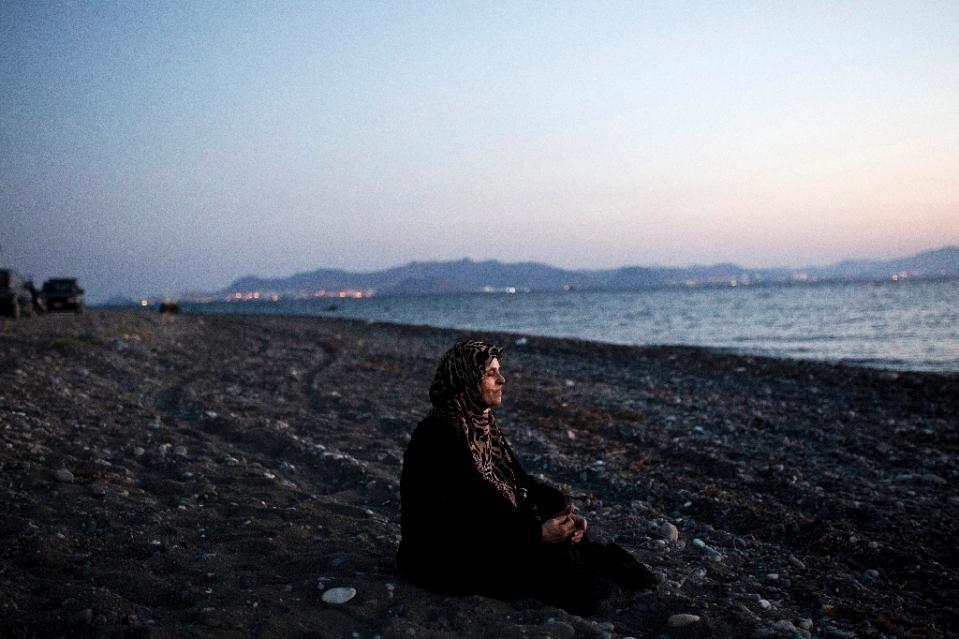"The road ahead is still long for me. I leave tomorrow. First I will go to Macedonia, then Serbia. I hope to reach Germany, where I will be treated like a human being," said 16-year-old Ibrahim Najjar, a Syrian Kurd.
Following a huge influx of migrants to the Greek island, Najjar was among about 2,000 relocated to a football stadium turned registration centre this week, where hundreds were beaten back by police with truncheons and sprayed with fire extinguishers.
Many of them had camped along the Greek island's roads and beaches in poor conditions for weeks, and Najjar said the scuffles that broke out were partly down to some refugees' "impatience".
"People were pushing instead of waiting in line. But I was waiting in that stadium for over two days without food or water, and I knew that if I left I would miss my turn," Najjar said as he stubbed out a cigarette outside the stadium on Wednesday, when a smaller group queued to finally register.

- 'Anywhere but here' -
Hadir, her husband and three children crossed the Aegean Sea from Turkey in an overcrowded dinghy four nights ago, and said the Greek authorities had given them "nothing".
"We have our papers now. We will leave Greece, though we don't yet know where we will go. We want to go anywhere at all, just not here," she said.
The family, who spent a year in Turkey after fleeing the devastated province of Idlib in northwestern Syria, said they paid 20 euros ($22) for a small tent on Kos and 40 euros for a larger one.
"We have nowhere to go. Every time we set ourselves up anywhere, the police show up and kick us out," said Hadir, 34.
Medical charity Medecins Sans Frontieres (Doctors Without Borders) said Wednesday it was "very worried" about the situation for migrants in Kos, as Greece sent in extra riot police to deal with the influx.
Sitting cross-legged next to her 12-year-old daughter Yamama on a piece of cardboard at the entrance to their tent, Hadir's voice quivered as she recalled the violence the family faced at the football stadium.
"It was terrible in there. The police were using their shields to hit people and sticks to hit the men. They also threw tear gas at us. There were children there," said Hadir, dressed in a simple black outfit with a black and violet headscarf.
- 'Too afraid to sleep' -
Others, such as Amina and her four children, don't even have tents to sleep in.
During the day, the family find shade under a tree and rest on pieces of cardboard while they gather strength before planning their next move.
"We are too afraid to sleep. We have been given a very bad welcome," said Amina, 35.
She comes from the Syrian Kurdish town of Kobane, which has seen several rounds of fighting pitting the jihadist Islamic State group against Kurdish troops in recent months.
"We go to the bathroom in the sea. What else can we do?" Amina said, wrapping a light purple scarf around her hair.
Her son Abdallah, a 16-year-old with bright green eyes, said he had expected their arrival in Greece to be easier.
All along the beach, people have hung up their scant belongings to dry. They wash in the sea, while some of the children play on the shore. They say there are no bathrooms and no running water, with very little assistance handed out.
"We were shocked. We came here for human rights, as there are no human rights in Syria," Abdallah said. "Things shouldn't be this way."
Mohannad, who is from the Syrian Kurdish city of Qamishli and used to work as an interior decorator, is also making plans to leave.
"Greece seems to have nothing to do with the European Union. The way they treat us is so bad," said the 27-year-old.
















Comments About This Article
Please fill the fields below.